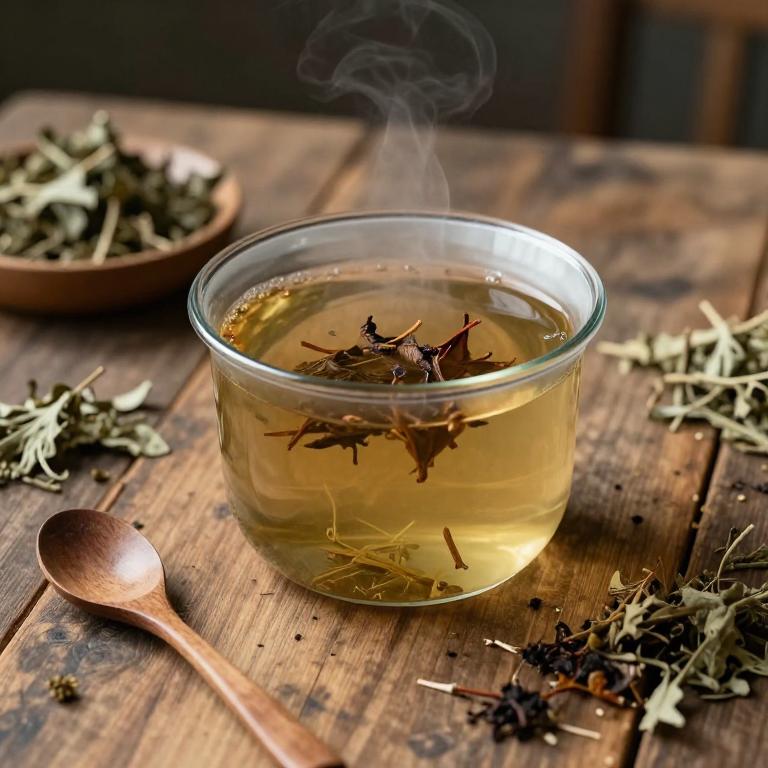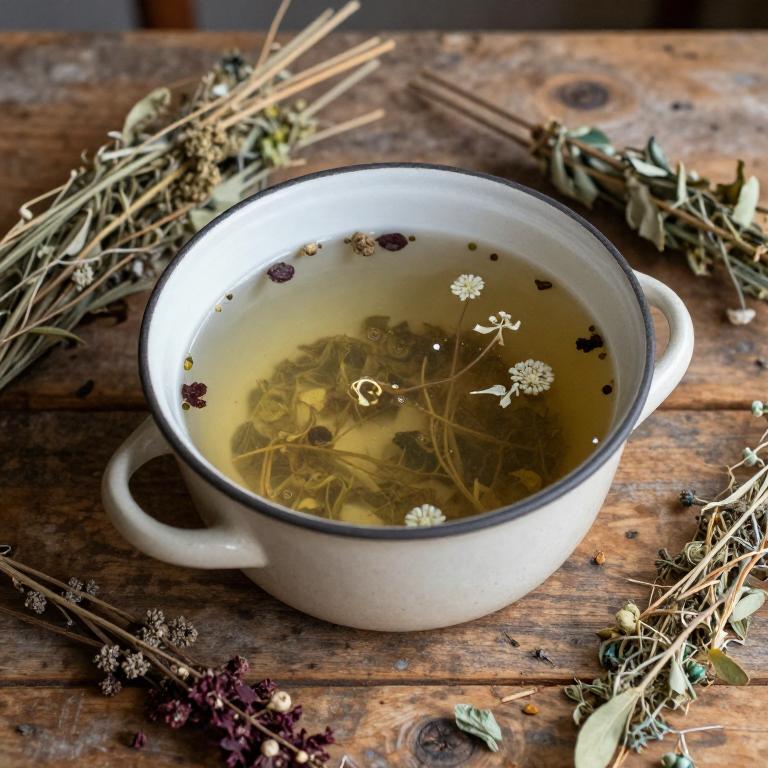10 Best Herbal Decoctions For Inflamed Mouth

Herbal decoctions have been traditionally used to soothe inflamed mouths due to their anti-inflammatory and antimicrobial properties.
Common herbs such as chamomile, licorice root, and sage are often included in these preparations for their soothing and healing effects. To prepare a decoction, the herbs are boiled in water for several minutes, then strained and cooled before use. This liquid can be used as a mouth rinse or applied directly to the affected area to reduce irritation and promote healing.
Regular use of such decoctions may provide natural relief from oral inflammation without the side effects associated with some pharmaceutical treatments.
Table of Contents
- 1. Echinacea (Echinacea purpurea)
- 2. St. john's wort (Hypericum perforatum)
- 3. Marigold (Calendula officinalis)
- 4. Salvia (Salvia officinalis)
- 5. Stinging nettle (Urtica dioica)
- 6. Oregano (Origanum vulgare)
- 7. German chamomile (Chamomilla recutita)
- 8. Aloe vera (Aloe barbadensis)
- 9. Licorice (Glycyrrhiza glabra)
- 10. Peppermint (Mentha piperita)
1. Echinacea (Echinacea purpurea)

Echinacea purpurea, commonly known as purple coneflower, has been traditionally used for its anti-inflammatory and immune-boosting properties.
Herbal decoctions made from its dried roots and leaves are often prepared by simmering the plant material in water for an extended period to extract its active compounds. These decoctions may help reduce inflammation in the mouth by inhibiting inflammatory pathways and promoting tissue healing. Some studies suggest that echinacea can alleviate symptoms of oral ulcers and gingivitis due to its antimicrobial and soothing effects.
However, it is important to consult a healthcare provider before using echinacea, especially for individuals with allergies or those taking other medications.
2. St. john's wort (Hypericum perforatum)

Hypericum perforatum, commonly known as St. John's wort, has been traditionally used for its anti-inflammatory and antiseptic properties, making it a potential remedy for inflamed mouth conditions.
Herbal decoctions of Hypericum perforatum can be prepared by simmering the dried plant material in water, allowing the active compounds such as hypericin and flavonoids to infuse into the liquid. These decoctions may help soothe oral irritation, reduce inflammation, and promote healing of mouth sores or ulcers. However, it is important to consult with a healthcare professional before using St. John's wort, as it may interact with certain medications.
Despite its historical use, further clinical research is needed to fully establish its efficacy and safety for oral inflammation.
3. Marigold (Calendula officinalis)

Calendula officinalis, commonly known as the pot marigold, has been traditionally used for its anti-inflammatory and soothing properties.
Herbal decoctions made from dried calendula flowers can be prepared by simmering the flowers in water for several minutes, creating a gentle infusion that is ideal for use in the mouth. This decoction is often applied as a mouth rinse or used to create a poultice to alleviate symptoms of inflamed mouth conditions such as canker sores or oral ulcers. The active compounds in calendula, including flavonoids and triterpenes, contribute to its ability to reduce inflammation and promote tissue healing.
Due to its mild nature, calendula decoctions are generally safe for most individuals, though it is advisable to consult a healthcare professional before use, especially for those with known allergies or existing medical conditions.
4. Salvia (Salvia officinalis)

Salvia officinalis, commonly known as sage, has been traditionally used for its anti-inflammatory and antimicrobial properties, making it a valuable herb for addressing inflamed mouth conditions.
Herbal decoctions of sage can be prepared by steeping the dried leaves in hot water for several minutes, allowing the active compounds such as rosmarinic acid and flavonoids to be extracted. These compounds help reduce inflammation, soothe irritation, and combat bacterial infections that may contribute to mouth inflammation. Sage decoctions can be used as a mouth rinse or applied directly to the affected areas for localized relief.
However, it is advisable to consult a healthcare professional before using sage, especially for prolonged periods or in individuals with specific health conditions.
5. Stinging nettle (Urtica dioica)

Urtica dioica, commonly known as stinging nettle, has been traditionally used in herbal medicine for its anti-inflammatory properties.
A decoction made from the leaves and stems of Urtica dioica can be prepared by simmering the dried plant material in water for several minutes. This herbal decoction is believed to help reduce inflammation and soothe irritated tissues in the mouth. However, due to its potential to cause irritation, it should be used with caution, especially when applied directly to sensitive oral areas.
It is often recommended to dilute the decoction or consult a qualified herbalist before using it for inflamed mouth conditions.
6. Oregano (Origanum vulgare)

Origanum vulgare, commonly known as oregano, has been traditionally used in herbal medicine for its anti-inflammatory and antimicrobial properties.
Herbal decoctions made from the dried leaves and flowers of O. vulgare can be prepared by simmering the plant material in water for several minutes, allowing the active compounds such as carvacrol and thymol to be extracted. These decoctions are often used to soothe inflamed mouths, including conditions like canker sores or gingivitis, due to their ability to reduce bacterial load and inflammation. The warm, aromatic solution can be applied directly to the affected area using a swab or as a mouth rinse, providing relief from pain and promoting healing.
However, it is advisable to consult with a healthcare professional before using oregano decoctions, especially for prolonged or severe oral inflammation.
7. German chamomile (Chamomilla recutita)

Chamomilla recutita, commonly known as German chamomile, has been widely used in traditional medicine for its anti-inflammatory and soothing properties.
Herbal decoctions made from its dried flowers are often prepared by steeping the flowers in hot water, creating a calming infusion that can be applied directly to inflamed mouth tissues. This natural remedy is particularly effective in reducing irritation, redness, and discomfort associated with conditions like canker sores, gingivitis, or mouth ulcers. The active compounds, such as flavonoids and essential oils, contribute to its antimicrobial and anti-inflammatory effects.
Regular use of chamomilla recutita decoctions can provide relief and promote healing in inflamed oral areas, making it a gentle and accessible option for natural mouth care.
8. Aloe vera (Aloe barbadensis)

Aloe barbadensis, commonly known as aloe vera, has been widely used for its soothing and anti-inflammatory properties, making it a popular ingredient in herbal decoctions for treating inflamed mouth conditions.
When prepared as a decoction, aloe vera contains mucopolysaccharides and glycoproteins that help to reduce inflammation and promote tissue repair in the oral cavity. This herbal remedy can be applied directly to the affected area using a cotton swab or mixed with water to create a gargling solution, providing relief from soreness and irritation. Its antimicrobial and antioxidant properties also help to prevent infection and support healing in cases of mouth ulcers or gingivitis.
However, it is important to use aloe vera in moderation, as excessive consumption may cause gastrointestinal discomfort.
9. Licorice (Glycyrrhiza glabra)

Glycyrrhiza glabra, commonly known as licorice root, has been traditionally used in herbal medicine for its anti-inflammatory and soothing properties.
When prepared as a decoction, it can help alleviate symptoms of an inflamed mouth by reducing irritation and promoting tissue healing. The active compounds in licorice root, such as glycyrrhizin and flavonoids, contribute to its ability to decrease inflammation and inhibit harmful bacteria. This herbal decoction is often used as a natural remedy for conditions like canker sores, mouth ulcers, and sore throats.
However, long-term use should be monitored due to potential side effects related to corticosteroid-like effects.
10. Peppermint (Mentha piperita)

Mentha piperita, commonly known as peppermint, is often used in herbal decoctions to alleviate symptoms of an inflamed mouth due to its cooling and anti-inflammatory properties.
When prepared as a decoction, the leaves and stems of the plant are simmered in water to extract their essential oils and active compounds, such as menthol and rosmarinic acid. This herbal remedy can help reduce pain, swelling, and irritation associated with conditions like canker sores or gum inflammation. The menthol content provides a soothing effect, while the antioxidants in peppermint support tissue healing.
However, it is important to use peppermint decoctions in moderation, as excessive use may cause gastrointestinal discomfort in some individuals.